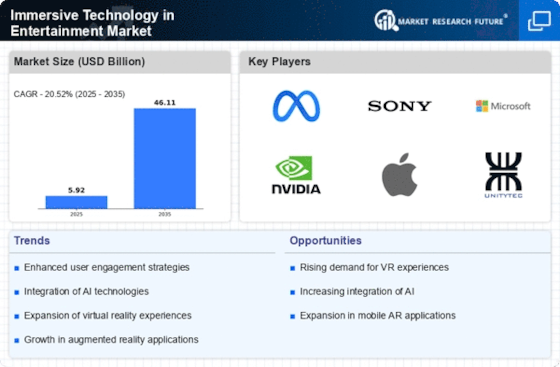Market Share
Immersive Technology in Entertainment Market Share Analysis
Immersive technologies such as virtual reality (VR), augmented reality (AR), and mixed reality (MR) are driving a sea change in the entertainment sector. VR headsets for gaming and interactive experiences are being increasingly adopted across the entertainment industry. Moreover, AR is becoming common among live events and live performances. But AR applications that superimpose digital items over live concerts and sports activities have become new reality hybrids experienced by spectators. There was an emergence of both interactive displays through AR during live music concerts and broadcasted sports games having augmented reality components, which alters how we look at our screens when viewing them as well as how we perceive ourselves as passive onlookers of action rather than participants in it. Digital versus physical worlds can now be blended with help from AR, thereby shifting perception regarding how people consume or even experience this area's content. The integration of virtual reality (VR) and augmented reality (AR) in theme parks and attractions is another key development in the entertainment market. It's also worth noting the growing popularity of VR and AR attractions that provide visitors with more profound involvement and entertainment. Another prominent trend is the growing use of immersive technology in film and television production, which has changed how we create and consume content. Producers have begun to experiment with virtual reality (VR) or augmented reality (AR) as a means to allow audiences to fully immerse themselves in their stories by becoming part of them with a view to making them active participants in narratives. On top of that, VR movies are able to give viewers access to digital environments where they can meet characters face-to-face as opposed to watching worn-out cinematic reels. In a marketing context, AR adds another dimension to promotional campaigns where augmented reality features can be embedded in movie posters or ads, thus creating interactive promotional experiences. Moreover, this trend has witnessed the rise of social VR platforms for virtual events in the entertainment industry. Social Virtual Reality (VR), for instance, enables people to connect in shared online spaces like avatars and go through immersive events such as concerts virtually. As such, social VR platforms are fostering a sense of presence among people on the web so that Facebook users can meet up anywhere without physically traveling there.



















Leave a Comment